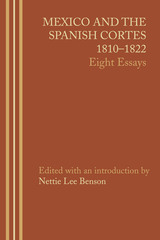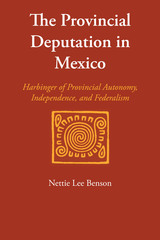
Few developments in the history of the Spanish colonial system in Mexico have been more carelessly treated or more often misinterpreted than the attempt to establish constitutional government in New Spain under the Spanish monarchy during the 1809–1814 and 1820–1822 periods. Yet the broad outlines of the Mexican constitutional system were laid then, largely through the insistent efforts of the Mexican deputies to the Cortes, the Spanish legislative body. Some of the delegates also grasped this opportunity to inform their countrymen and train them in the effectiveness of parliamentary debate and resolution as a more intelligent road to democratic and representative government.
The 70 Mexican deputies (of the 160 elected) who actively participated in the sessions of the Cortes either helped draw up the Constitution of 1812, which initiated provisions for many needed reforms relating to military, religious, economic, educational, judicial, and governmental affairs in Mexico, or contributed to the enabling acts consequent to these provisions. The prime reason for calling the Cortes, however, and especially for inviting the participation of the Mexicans, was to attempt to maintain New Spain’s loyalty to the mother country, an unrealized objective in the long run, although much constructive discussion of this goal was offered by the Mexican delegates.
These eight essays trace the establishment and implementation of the Mexican electoral system, both national and municipal, and of reforms in the economic, journalistic, religious, and military systems. They serve as an informative introduction to the revolutionary role the Cortes of Spain played in Mexican history and as a record of the contribution of Mexican delegates to the beginning of liberal reform in their country.

Mexico and the United States each have a constitution and a federal system of government. This fact has led many historians to assume that the Mexican system of government, established in the 1820s, is an imitation of the U.S. model. But it is not.
First published in Spanish in 1955 and now translated by the author and amplified with new material, this interpretation of the independence movement tells the true story of Mexico's transition from colonial status to federal state. Benson traces the Mexican government's beginning to events in Spain in 1808–1810, when provincial juntas, or deputations, were established to oppose Napoleon's French rule and govern the provinces of Spain and its New World dominions during the Spanish monarch's imprisonment.
It was the provincial deputation, not the United States federal system, that provided the model for the state legislative bodies that were eventually formed after Mexico won its independence from Spain in 1821. This finding—the result of years of painstaking archival research—strongly confirms the independence of Mexico's political development from U.S. influence. Its importance to a study of Mexican history cannot be overstated.
READERS
Browse our collection.
PUBLISHERS
See BiblioVault's publisher services.
STUDENT SERVICES
Files for college accessibility offices.
UChicago Accessibility Resources
home | accessibility | search | about | contact us
BiblioVault ® 2001 - 2024
The University of Chicago Press









